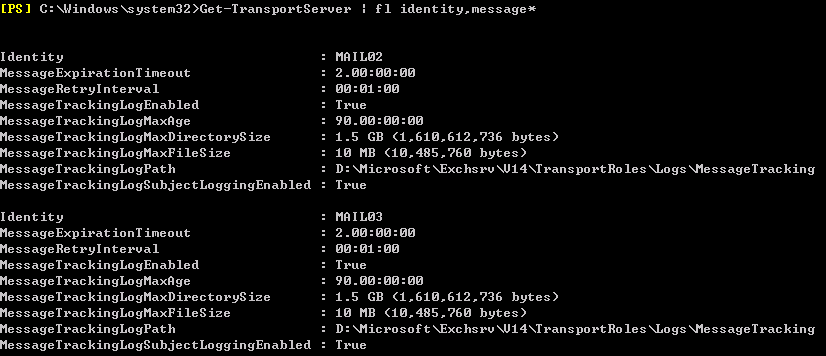需要统计Exchange服务器在给定时间范围(perWeek 7天,perMonth 30天…perSeason 90天等)收发邮件的总数和总容量大小,以便做成报表提出升级预期。
解决:统计总数很简单,用命令带上Meansure就可以输出count数量。
#接收就写Receive 发送就写Send Get-TransportServer | get-messagetrackinglog -Start "2012/4/1 10:42:00" -End "2012/5/1 00:00:00" -EventId Receive | Measure-object
但是如果要统计容量,就必须取变量,做加权了。在TechNet Gallery上找到了这么一则脚本
http://gallery.technet.microsoft.com/scriptcenter/ba5bd64d-6025-415a-86ed-2b51f9aabaf0
作用是:This script counts the number of e-mails that are sent and received in your Exchange environment per week, including their total size in MB.
直接拿来加以改动,得到符合我们需求的脚本,代码如下:
# Script: TotalEmailsSentReceivedPerMonth.ps1
# Purpose: Get the number of e-mails sent and received per week
# Modified Purpose: get the number of e-mails sent and received per 30 days since today before.
# Author: Nuno Mota
# Date: October 2010
# Modify: Soda
# ModifyDate: June 2014
# From date should be a MONDAY
#$From = Get-Date "06/02/2012"
#$To = $From.AddDays(7)
#the $To date initializes as today‘s date, the $To date minus 30 days gives the $From date.
$From = $to.adddays(-30)
$to = get-date
[Int64] $intTotalSentSize = $intTotalSent = 0
[Int64] $intTotalRecSize = $intTotalRec = 0
Write-Host "From, To, # Sent, Size Sent, # Received, Size Received"
#Do
#{
#Get-ExchangeServer | ? {$_.AdminDisplayVersion -match "8.3" -and $_.IsHubTransportServer -eq $True} | Get-MessageTrackingLog -ResultSize Unlimited -Start $FromSmall -End $ToSmall | ForEach {
Get-TransportServer | Get-MessageTrackingLog -ResultSize Unlimited -Start $From -End $To | ? {$_.MessageSubject -ne "Folder Content"} | ForEach {
# Sent E-mails
If ($_.EventId -eq "RECEIVE" -and $_.Source -eq "STOREDRIVER")
{
$intTotalSentSize += $_.TotalBytes
$intTotalSent++
}
# Received E-mails
If ($_.EventId -eq "DELIVER")
{
$intTotalRecSize += $_.TotalBytes
$intTotalRec++
}
}
# Convert the size to MB and round it
$intTotalSentSize = [Math]::Round($intTotalSentSize/1MB, 0)
$intTotalRecSize = [Math]::Round($intTotalRecSize/1MB, 0)
# Create a TempTo variable as when we are searching the logs we search up to the next day, but we want to print the day before
$TempTo = ($To.AddDays(-1)).ToShortDateString()
$FromSmall = $From.ToShortDateString()
Write-Host "$FromSmall, $TempTo, $intTotalSent, $intTotalSentSize, $intTotalRec, $intTotalRecSize"
# Reset the variables to do another search
#$From = $From.AddDays(7)
#$To = $From.AddDays(7)
#$intTotalSentSize = $intTotalSent = 0
#$intTotalRecSize = $intTotalRec = 0
#}
#While ($To -lt (Get-Date))
原有的代码也都保留下来,只是注释掉了。
由于我们要统计今天之前30天的,那么start就是30天之前的日期,to就是今天的日期。
(开始以为只有增加天数的方法AddDays(),没想到在里头填个负数就变成了减少天数的方法了)
如果需要统计更多天数的,则直接改adddays()里头的数量。前提是你的MessageTrackingLog保留的时间足够长。
运行代码后获得的结果如下:

配置TrackingLog的方法:http://technet.microsoft.com/en-us/library/aa997984(v=exchg.150).aspx
当前的服务器我已经修改为保留90天,最大日志总量1.5GB

Latest posts by Exchange中文站 (see all)
- 微软将推出卫星解决方案:可连接到 Azure 云服务 - 2020年9月17日
- Windows Terminal 1.0正式发布 - 2020年5月25日
- Azure Lighthouse 相关介绍 - 2020年3月2日
发布于:
浏览:4292 次

还没有评论